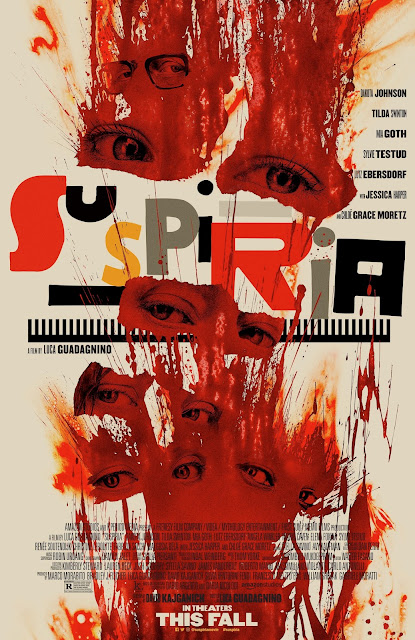Suspiria (2018) ****
Suspiria (2018) is the best kind of remake and the best kind of art film. Re: the first point—director Luca Guadagnino and writer David Kajganich take the basic premise of Dario Argento's 1977 film, that of an elite dance school in Germany run by witches, and use it as a springboard to go gonzo. Re: the second point—a. I'm still not quite sure exactly how much I liked the film; I'm still processing it and b. Suspiria '18 is clearly a film that is not out to please a mass audience (and that is something I appreciate, when directors are willing to take risks), be that due to its running time (and it is just a bit too long, in my opinion), its languid pace or its grotesque imagery.
Guadagnino wisely chose not to imitate or pay homage to Suspiria '77's famous primary color palette (in particular red) and rather go with a more muted tone and create his own fantastic and phantasmagorical set pieces. There are references to all three of the films that comprise Argento's Three Mothers trilogy (including a cameo by S77's lead Jessica Harper), but S18 forges its own path. Additionally, Thom Yorke's score is a completely different beast from Goblin's classic score from the original film, though they are both experimental and memorable in different ways. Interestingly, one of the piano themes, played numerous times throughout the film, bears a striking resemblance to Fabio Frizzi's piano theme, "Verso L'Ignoto", from Lucio Fulci's The Beyond (1981).
Much like the original film, this new version casts a female in every major role, even going so far as to have Tilda Swinton play a male character in heavy makeup (one of her three roles in the film). And this makes sense, given that motherhood is the overarching theme of the film (though I did find Swinton's Dr. Josef Klemperer character a bit distracting at first). I found Dakota Johnson's version of Susie Bannion to be strong, engaging and every bit the equal of Harper's original.
After a single viewing, I'm undecided whether or not I feel certain scenes/themes were necessary. Without getting spoilery, I don't think I particularly liked the epilogue (maybe that will change with another viewing?), I'm not sure that the political backdrop added much to the story, and I'm still trying to determine whether I felt that Klemperer's backstory was needed. Additionally, I thought the editing and pacing during the first 20 minutes or so was a bit hodgepodge and left me unsure exactly what was going on (which didn't help matters later on)—hopefully a rewatch will help to clarify this.
To summarize, while I'm not immediately head over heels in love with Suspiria (2018) (and it's far from perfect), I can't help but award it four stars because I'm still thinking about it and looking forward to revisiting it. My hope is that it earns my appreciation slowly and only gets better with each viewing—as I mentioned at the beginning of my review, the best type of film.
Guadagnino wisely chose not to imitate or pay homage to Suspiria '77's famous primary color palette (in particular red) and rather go with a more muted tone and create his own fantastic and phantasmagorical set pieces. There are references to all three of the films that comprise Argento's Three Mothers trilogy (including a cameo by S77's lead Jessica Harper), but S18 forges its own path. Additionally, Thom Yorke's score is a completely different beast from Goblin's classic score from the original film, though they are both experimental and memorable in different ways. Interestingly, one of the piano themes, played numerous times throughout the film, bears a striking resemblance to Fabio Frizzi's piano theme, "Verso L'Ignoto", from Lucio Fulci's The Beyond (1981).
Much like the original film, this new version casts a female in every major role, even going so far as to have Tilda Swinton play a male character in heavy makeup (one of her three roles in the film). And this makes sense, given that motherhood is the overarching theme of the film (though I did find Swinton's Dr. Josef Klemperer character a bit distracting at first). I found Dakota Johnson's version of Susie Bannion to be strong, engaging and every bit the equal of Harper's original.
After a single viewing, I'm undecided whether or not I feel certain scenes/themes were necessary. Without getting spoilery, I don't think I particularly liked the epilogue (maybe that will change with another viewing?), I'm not sure that the political backdrop added much to the story, and I'm still trying to determine whether I felt that Klemperer's backstory was needed. Additionally, I thought the editing and pacing during the first 20 minutes or so was a bit hodgepodge and left me unsure exactly what was going on (which didn't help matters later on)—hopefully a rewatch will help to clarify this.
To summarize, while I'm not immediately head over heels in love with Suspiria (2018) (and it's far from perfect), I can't help but award it four stars because I'm still thinking about it and looking forward to revisiting it. My hope is that it earns my appreciation slowly and only gets better with each viewing—as I mentioned at the beginning of my review, the best type of film.


Comments
Post a Comment